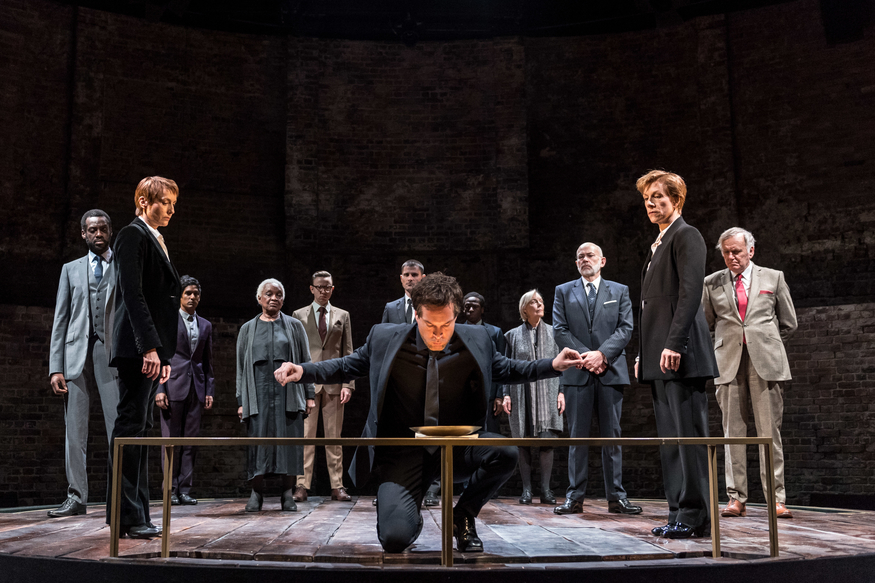Mary Stuart Is A Mirror For Present-Day Politics
Looks like this article is a bit old. Be aware that information may have changed since it was published.

Knowing the controversial story behind the death of Mary, Queen of Scots before seeing Almeida's superb production of Mary Stuart is unnecessary. You might as well be watching a behind-the-scenes guide to the political turbulence that has rocked British politics post-Brexit.
Originally written in 1800 by Friedrich Schiller — whose ideologies centred around 'aesthetic education' in times of political crisis — this modernised version takes it one step further than the German playwright (and previous versions — including Peter Oswald's 2005 rendition that starred Janet McTeer and Harriet Walter) by introducing a coin toss that determines which actress will play the imprisoned Mary, Queen of Scots (or Mary Stuart) and which will play England's reigning monarch, Queen Elizabeth I.
With only five weeks rehearsal time, no longer than other Almeida productions, Juliet Stevenson and Lia Williams learned both roles under the supervision of Almeida's Associate Director Robert Icke.
While this is the kind of gimmick you may see in a short Fringe concoction, it magnificently translates into this three-hour production. Once the coin lands, the production goes off like a firecracker, throwing an interchange of fast-paced, whodunnit-style scenes at the audience.
The immediacy gives added weight to nail-biting decisions that catholic Mary and her protestant-supporting cousin/captor Queen Elizabeth I must make in the pressures surrounding a death warrant that quite literally hangs over the head of the former leader of Scotland.
Reminiscent of today's anything-can-happen political charades, we see secret out-of-council meetings, back-stabbing deals signed, and both women teased and then seduced by the all-male royal council.
Icke conjures up sharp, quick-witted and at times smouldering dialogue to pose the questions: is gender bias at the root of political turmoil, or does the problem lie in the obsessive need for humans to retain control?
While each actress embodies the real-life historical figures with utmost precision — in our case Williams as a feisty, wilful Mary and Stevenson as an impassioned, empathetic Queen — we're told it's worth seeing them in reversed roles, giving a completely different outlook on the dramatic showdown.

The unsettling tension is enhanced with a meaty, and impressively diverse, ensemble cast, as well as a score from Paul Arditti that subtlety builds until singer Laura Marling brings things to a musical head with a transfixing tune which was created specially for the play.
Production and costume design are masterfully crafted by Hildegard Bechtler, who effectively overlaps scenes by way of a simple spinning stage. She also unconventionally fits the dual leads in smart suits, not unlike those worn by Theresa May.

Queen Elizabeth's final costume is both haunting and stunning, with Bechtler harking back to the traditional dress complete with corset and beautifully embroidered neck and wrist ruffs.
This show will get to you on a number of levels. But perhaps most mind-binding is the chilling, uncanny comparison of 16th century politics with today's current state of affairs. Where does that leave us in terms of progression?
Mary Stuart continues at the Almeida until 21 January 2017. Tickets are £10 - £60. Londonist saw this on a complimentary ticket.
Last Updated 19 December 2016



